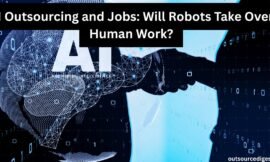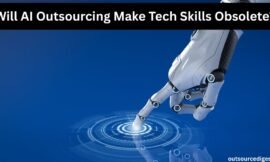Artificial intelligence (AI) has already transformed industries ranging from healthcare to finance, and outsourcing has played a huge role in this transformation. As we approach 2026 and beyond, AI outsourcing is expected to accelerate even further—reshaping the way businesses operate, hire talent, and deliver value to customers.
But what exactly does the future hold? This article explores the major AI outsourcing trends expected to dominate in the coming years and how they will impact both companies and professionals worldwide.
Why AI Outsourcing Is Booming
Companies are outsourcing AI for one simple reason: it helps them innovate faster without bearing the full cost of building in-house teams. By 2026, businesses will increasingly rely on outsourcing for:
- AI-driven automation of operations
- Data processing and analysis at scale
- Specialized AI development (e.g., NLP, computer vision, robotics)
- 24/7 global customer service powered by AI
Outsourcing allows organizations to scale quickly while staying competitive in a world where AI adoption is no longer optional.
Key Trends in AI Outsourcing for 2026 and Beyond
- The Rise of Hyper-Automation
By 2026, outsourcing firms will deliver end-to-end automation—from data collection to decision-making systems. Businesses won’t just outsource AI tools; they’ll outsource entire automated workflows that reduce manual labor.
- Global Talent Redistribution
AI outsourcing will shift talent pools worldwide. Emerging markets in Eastern Europe, Southeast Asia, and Latin America will become AI hubs, offering cost-effective but highly skilled developers. This diversification will reduce dependency on traditional outsourcing giants like India alone.
- AI-as-a-Service (AIaaS) Outsourcing
Instead of building custom solutions, companies will increasingly subscribe to AIaaS platforms through outsourcing providers. These services—covering machine learning, computer vision, and natural language processing—will make AI more affordable for startups and mid-sized businesses.
- Focus on Ethical and Responsible AI
With governments introducing stricter regulations, ethical AI will no longer be optional. Outsourcing providers will be tasked with ensuring fairness, transparency, and compliance with global laws. Businesses will outsource AI ethics consulting alongside development.
- Integration with Cybersecurity
As AI systems become mission-critical, cybersecurity outsourcing will merge with AI outsourcing. Providers will not only build AI tools but also protect them from bias, manipulation, and cyberattacks.
- Human-AI Collaboration Models
Rather than replacing jobs, outsourcing partners will focus on AI-human collaboration. For example, outsourced AI systems will handle repetitive tasks, while humans provide judgment, creativity, and emotional intelligence. This trend will redefine what “outsourced work” means.
- Industry-Specific AI Outsourcing
By 2026, outsourcing won’t just be general-purpose—it will be verticalized:
- Healthcare outsourcing for medical imaging AI.
- Finance outsourcing for fraud detection and compliance.
- Retail outsourcing for AI-driven personalization and logistics.
- Education outsourcing for adaptive learning platforms.
- Cost Models Will Evolve
Instead of flat contracts, AI outsourcing will adopt outcome-based pricing models. Companies will pay based on results—such as improved efficiency, higher sales, or reduced risk—rather than just hourly rates.
Challenges Ahead
Despite its growth, AI outsourcing faces challenges that will shape its future:
- Data privacy concerns arise when sensitive information crosses borders.
- Skill shortages in cutting-edge AI fields.
- Over-dependence on vendors may weaken internal capabilities.
Companies will need to balance outsourcing with building internal expertise to remain resilient.
How Businesses Should Prepare
To take advantage of future AI outsourcing trends, companies should:
- Adopt hybrid models: Blend in-house AI talent with outsourced expertise.
- Prioritize ethical AI: Work with providers that follow global standards.
- Strengthen contracts: Define responsibilities for data security and outcomes.
- Invest in training: Upskill employees to manage outsourced AI systems.
Conclusion
The future of AI outsourcing will be defined by automation, global collaboration, ethical compliance, and hybrid talent models. Far from replacing human skills entirely, outsourcing will make AI more accessible—empowering companies of all sizes to innovate.
By 2026 and beyond, businesses that embrace these trends will stay competitive, while those that resist risk will fall behind.





